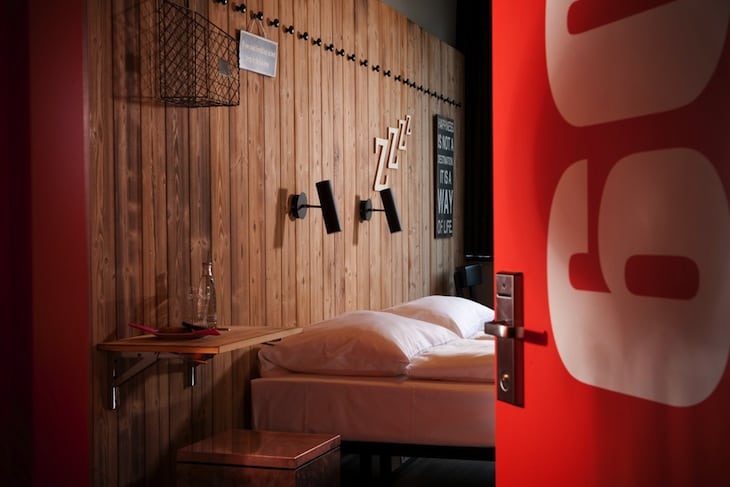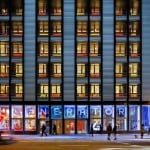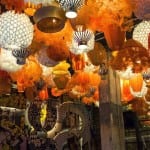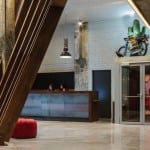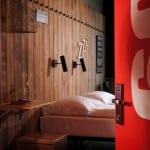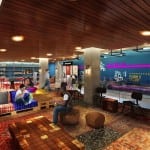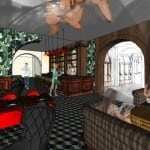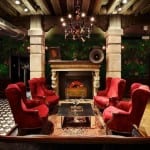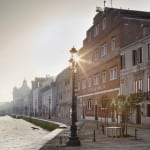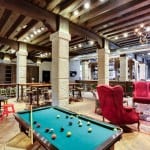Skift Take
There's huge growth potential in the hybrid hostel/hotel market, luring new guest types with high-concept design and single rooms, and it's coming to America.
- The exterior of Generator Barcelona.
- A fashion event at Generator Copenhagen.
- Lamps in a lounge at Generator Barcelona.
- The check-in desk at Generator Barcelona.
- A private ensuite at Generator Berlin Mitte.
- Rendering of the exterior at Generator Paris.
- Rendering of the interior lobby at Generator Paris.
- Renderings of the lobby at Generator Rome.
- The lobby at Generator Venice.
- Exterior of Generator Venice.
- Pool table in the lobby at Generator Venice.
In Europe, Generator Hostels is leading the way in the burgeoning “hip hostel” market with high-concept design and unique programming, fueled by a relentless storm of 24/7 social media among guests and staff. This is a hospitality brand forged out of the sharing economy and Millennial/Gen C travel trends.
Generator is also aggressively targeting older travelers in higher income brackets with a growing selection of single guest rooms. There’s massive space for global growth here as the hybrid hotel/hostel model offers a new accommodation genre that provides excellent location, exceptional value, and private rooms for people uncomfortable paying rising hotel rates in popular urban centers.
So far, the end result has been devoutly loyal guests sharing their experiences with past and potential guests in an exponentially growing online network. Which, of course, is exactly what mainstream hotels are trying to achieve, faced with fracturing guest demographics, non-traditional competition and executive leadership sometimes entrenched in the past.
“I attribute the growth of our company to the incredible and increasing sophistication of young travelers today,” says Josh Wyatt, 39, director of hospitality/leisure at Patron Capital Partners, founder of Generator Hostels and Harvard MBA grad. “Over 90 percent of our guests are walking into a Generator with a tablet or smart phone, and they have an incredible amount of info at their fingertips. As a result, for us to be successful we have to have an equally sophisticated product.”
It’s working. This spring, the 154-room Generator Barcelona opened with 22 percent of its room count dedicated to singles/couples. Generator Venice opened last month with average rates starting at 35 euros. Next year, the enormous 950-bed Generator Paris and 264-bed Generator Rome are scheduled to open.
America is next.
“We have great ambitions in the U.S.,” says Wyatt. “We’re in negotiations in New York now, and we’re looking at Washington, D.C., Miami, L.A. and Boston.”
I spoke with Wyatt on the phone recently while he was visiting New York during those negotiations.
Skift: Josh, your hostels don’t look like the common perception of hostels. What is your overall design vision?
Josh Wyatt: We took a view six years ago when we started Generator that we were going to focus on and cater to, at the time, this emerging market, which is now very established. It’s a class of traveler who wants great atmosphere and a great experience, and at the same time, they want great value.
So a core part of our strategy was our interior design. I reached out to a personal friend of mine, Anwar Mekhayech at The Design Agency, who at the time was an up-and-coming Canadian interior designer. He was really within the brand ethos of what I thought Generator could be, which was fresh, energetic, sexy, and that emphasized a completely new look.
The public spaces in every Generator are all unique to the local city, and that’s very, very important. Each property is designed to really reflect the local culture, with an acknowledgment that, while there is this global, nomadic travel culture out there, at the same time, there are key experiential things in each city that we want to bring into the property.
Skift: Can you provide an example?
Josh Wyatt: So a good example is Venice. Instead of flipping through a design catalogue, we had Anwar rent a Fiat van and drive around to all the famous antique and trade fair shows in Verona, Treviso, and Milan. So now when you walk in and see all of these authentic curiosities, you’re like, ‘Wow, this is amazing.’
It’s actually funny, I was sitting there a couple weeks ago and these four American girls walked in. And I think they were tired from traveling or something, and one of them said, ‘Hi, excuse me, we’re a little lost, we’re looking for a hostel somewhere around here.’
That’s what we want to do. We want to surprise people with design, and excite them, and in some cases distort people’s reality about what a hostel can be.
Skift: Are your single rooms a conscious decision to attract a wider demographic of travelers?
Josh Wyatt: Absolutely. We call them either ‘twin or double private ensuites,’ meaning it’s a private room—it’s just like a hotel room with a nice bathroom. All of our properties have private ensuites, and how many varies depending on the city.
In Barcelona, on the top floors, the private rooms have balconies with these amazing views overlooking the city and Sagrada Familia all the way to the ocean. So is that a normal hostel experience? No. It really does feel like a hotel room. It’s going to be the same way in Paris with private rooms and balconies on the top floors.
We’re seeing a dramatic increase in demand for those, and we’re definitely catering to that in our new properties. I love those rooms. In a way, I sort of designed them for myself. I wanted them to be the kind of room I would want to stay at when I’m tired or on business and I need a good night’s sleep.
They have two twin beds with a zip and lock system, so you can pull them together to create one double bed.
Skift: Your blog is among the most creative and robust I’ve seen in hospitality. Is that a significant driver of business?
Josh Wyatt: Our entire online platform with the blog and social media is a way of really building a brand voice and loyalty with our guests. There is still a case for traditional marketing, but we know our target audience is making their travel decisions and doing their research online through our various social media channels.
All of those channels have thousands of followers. We just hit 32,000 likes on Facebook, so we use that to tell people what’s happening.
I sort of put myself in their position. You know, 10 or 15 years ago you would arrive in a city and you wouldn’t know where to go. You’d have a very heavy guidebook to flip through that got updated once a year. You might be a little intimidated if you didn’t speak the language. And it would take a day or two just to land on your feet and figure out where to go and what to see and do. Especially if you were traveling alone.
So isn’t it cool that a week ahead of coming to Generator, you can pop open the blog, go to Facebook, and find out what’s going on at the property? And very consciously, we also want people to know what’s happening outside in the city.
I love the fact that we encourage our front-of-the-house staff to really know what’s going on. We train them to tweet and use Facebook and Instagram to get those kind of messages out there, because a lot of times in Europe, events just sort of happen with an hour’s notice. We get as much out there as possible, and we ask the front-of-the-house staff to include hashtags so everyone can benefit. You don’t even have to be staying at Generator.
Skift: Can you talk about the value of booking Generator?
Josh Wyatt: Sure, let’s use Copenhagen as an example. It can be an expensive city where an average room in, say, a 2- or 3-star old business hotel is around 225 euros per night. Our twin rooms, depending on season, are 80 to 120 euros.
I look at it this way. Why do people travel? It’s to create a memory. So we’ll have rooftop yoga, fashion shows or evening flamenco classes. We have guides come in and do a walking tour of the city. There’s always, always something going on.
We also typically do about 80 to 90 percent occupancy, so in London or Paris, when it opens, every night you’re going to have 600 to 700 people walking through the lobby. That is just an incredible amount of energy.
For me what makes Generator exciting, it’s the confluence of the ability to bring great design and really cool, fun, sexy events out to the masses. You don’t have to be wealthy, you don’t have to be privileged to experience something truly unique and special. We’re pretty proud of that.
That is probably the greatest accomplishment. So when I’m traveling some day 10 years from now with my kids across Europe, I can say, ‘Hey, we created something in Venice,’ which most people find expensive. Instead of staying in a crappy hotel and paying $20 for a Bellini, you can come and stay at Generator and have a four euro glass of wine, which we sourced from the local area.
We’re also introducing this incredible culture to people who, until they’re better off economically, generally don’t have the opportunity to see that kind of stuff.
With Rome, that property is across the street from one of the largest food markets in the city, which is where we’ll source a lot of ingredients for the kitchen. Rome and Venice are what we call our ‘jewel box hostels’—it’s a very curated experience. They’re smaller and a little more quite, and there’s a big focus on the regional cuisine.
Skift: You obviously feel the Generator brand will convert well in the U.S.?
Josh Wyatt: If you go back to the ethos of our brand, it’s to delight and surprise our guests. A lot of our guests don’t have the budget to stay in a Standard or W or Ace, or some of these really cool boutique hotels. They might not have the budget to stay in that type of property for perhaps another five or 10 years.
We’re taking great pride in the fact that we’re trying to introduce the idea of boutique hotels and boutique design down into the hostel space. In Paris, the penthouse suites are going to compete with any boutique hotel in the city.
So that way, anyone can have an amazing experience in a creative atmosphere, while meeting people from different cultures and different age groups all under one roof. That’s really what Generator is all about.
Greg Oates covers hospitality trends and next generation hotels. He has participated in 1,000+ hotel site inspections in over 50 countries.
Have a confidential tip for Skift? Get in touch
